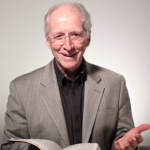 Article: What is Calvinism? by Dr Herman Selderhuis, professor of church history at the Theological University Apeldoorn in the Netherlands and president of the International Calvin Congress. He is author of John Calvin: A Pilgrim’s Life. Original source here.
Article: What is Calvinism? by Dr Herman Selderhuis, professor of church history at the Theological University Apeldoorn in the Netherlands and president of the International Calvin Congress. He is author of John Calvin: A Pilgrim’s Life. Original source here.
Calvinism” emerged as a term of insult from Lutherans addressing Reformed Protestants in order to separate themselves emphatically from the Reformed doctrine of the Lord’s Supper. Although John Calvin distanced himself from it, just as Luther protested the name “Lutherans,” this term has nevertheless been preserved, although it is problematic. Calvinism is considered a synonym for “Reformed” and thus is typically understood as referring to something broader than the theology of Calvin himself. In addition to the Holy Scriptures as the most important norm, Calvinism serves, apart from Calvin’s own theology, as an independent continuation of the theological work of others including that of Augustine and Luther, as well as the works of Reformers such as Philip Melanchthon, Martin Bucer, Heinrich Bullinger, and Theodore Beza, all of whom are sources for what is called Calvinism. The explanation for the fact that Calvin’s thinking is manifested not only in a multitude of Calvinist movements, but also in Lutheran Pietism, Methodism, Anglicanism, Baptist theology, and Puritanism, has to do with the fact that Calvin’s theology contains elements that made it interesting and attractive in the early modern period because it was easily transformed and adapted. The term Calvinism is too broad and too diverse to be exact and could be replaced by Reformed Protestantism. Since, however, Calvinism is widespread and widely used, it should continue to be used, with a few caveats.
THE SPREAD OF CALVINISM
The spread of Calvinism in the sixteenth century may be called impressive in terms of time and scope. By 1554, there were about half a million Reformed Christians, but as early as 1600 there were approximately ten million. From the very beginning, Calvinism was strongly internationally oriented and has remained so since then. Factors relating to this rapid and extensive dissemination were, above all, Calvin’s Academy in Geneva, the universities of Heidelberg and Leiden, and other Reformed academic institutions where theologians and lawyers from all over Europe were trained. Calvinism has also had a great influence in Eastern Europe, especially in Hungary and parts of Romania. The initial spread in France could only be counteracted by force. In the German-speaking world, Calvinism gained the upper hand except in some Swiss cantons and in areas such as the Palatinate and East Frisia. In Scotland and the Netherlands, there were no Calvinist churches but national Reformed Churches, which in reality were connected to secular governments by law and as such were less “Reformed” in practice. Reformed theology has contributed to a worldview that has had a great impact on Western society and has also affected developments in church and theology in the Far East (Indonesia, Korea, Japan) and South Africa. That there is great diversity within the broad Reformed tradition is, for example, evident from the fact that both Friedrich Schleiermacher and Karl Barth belong to it. Although efforts have been made to create a contradiction between Calvin and the Calvinists in the sense that developments in Reformed orthodoxy had substituted rigid scholasticism for the dynamics of Calvin’s theology, more recent research has proven that there is no basis for such a contradiction. Also, the Synod of Dort (1618–19), which is seen as a highlight in the history of Calvinism, remained in Calvin’s line. Its decisions on double predestination, for example, were supported by delegates from Switzerland, Germany, and England, all representing various traditions within Calvinism.
THE THEOLOGY OF CALVINISM
The authority of the Bible as the source and norm for all of life, the sovereignty of God, and the responsibility of man are essential elements of Calvinistic doctrine. The Reformed doctrine of the Scriptures is formulated emphatically in the Reformed confessions. There it is confessed that the Scripture has supreme authority (because it is theopneustos, “God-breathed”), and that it is perfect, reliable, and sufficient.
Calvinism is distinguished in particular by the function of the law as well as by an openness to earthly life. In Calvin’s mind, the law has continuing meaning and is regarded as a rule for Christian life. This view is expressed in various ways, including paying attention to a correct lifestyle, a commitment to mercy, continuing reflection on law and justice, and the question of the right of resistance of subjects to the authorities. Openness to the earth has to do with Calvin’s view that God is also revealed in creation; thus, scientific research contributes to the recognition of God (Francis Bacon and Isaac Newton, among others). Culturally, Calvinism inside the church led to resistance to the cult of images as a threat to the proclamation of the Word and outside the church to an impulse for art and culture as a means of worshiping God. There is, at the same time in Calvinism, a sense of reservation concerning culture and science, because these can also become a spiritual danger.
Concentration on the Word and the cognitive approach of the theology of Calvin can be seen in the fact that Calvinism has a distinguished history in terms of creating a reading culture and has attracted many intellectuals to its folds over the centuries. This “binding to the Bible” has resulted in a church order that emanates from the independence of the church over against the governing authorities and assigns the elders the direction of the church. The function of the elders, who play the central role in the church, is typical of the Calvinist understanding of the church. The key to the Lord’s Supper lies in the exercise of the church’s discipline.
The understanding of the unity of Scripture results in a strong identification with Old Testament Israel. This identification manifests itself in a predilection for the book of Psalms both in preaching and in liturgy. The singing of these psalms further strengthened this identification, indeed, because of another characteristic of Calvinism, namely the pilgrimage motif. The persecution of the Reformed and their refugee existence led them, in their own opinion, to play the role of Israel expelled from Egypt to live in the desert on their way to heaven, the Promised Land. This predilection for the Old Testament can be seen in the many commentaries that appeared from the Reformed side on this part of the Bible. As a result of this understanding, the study of Hebrew and related fields has also reached an especially great flowering in Reformed circles.
LUTHER AND CALVIN
As much as Calvin desired to do so, he never met Martin Luther personally. The only occasion for contact that could have occurred between Calvin and Luther was prevented by Philip Melanchthon, because he did not dare to forward the letter Calvin had written to Luther in January 1545. There are some remarks of Luther in which he reports positively about Calvin’s works. As to Luther’s influence on Calvin, it is evident that the Genevan was in the true sense a pupil of the Reformer in Wittenberg. Calvin was convinced to build on the foundation Luther laid down, not to imitate Luther or just repeat what he had said but to further develop Luther’s theology without changing it. As to differences, it can be said that Calvin had more trouble with Luther’s character than with his ideas. That Calvin saw his own teaching of the Lord’s Supper substantially in agreement with that of Luther is clear, but he did criticize him for sticking too much to the physical presence of Christ in bread and wine. Apart from this point, Calvin stays completely in line with Luther. This influence of Luther on Calvin means Luther’s thought can be found in a much wider selection of theological traditions than just the Lutheran one. It is also due to international Calvinism that Luther can be found worldwide, as his spirituality, his liturgical insights, his views on preaching and teaching, and much more of his work has shaped endless numbers of Calvinists worldwide to this very day.
INFLUENCE
It goes without saying that Calvinism has a worldview of its own. It, thus, has exerted great influence in the fields of sociology, politics, economics, and law. Although the so-called Weber thesis, according to which there is a direct link between Calvinism and capitalism, is scientifically disproven, a certain influence of Calvinism on economic developments cannot be denied. Calvin was the first Christian thinker to develop a theory of the biblical right to interest rate recovery, which gave trade a vital impetus. Calvinism’s views on justification and sanctification and the strict practice of church discipline have led to a lifestyle that is strongly inspired by the Bible.
The influence of Calvinism, with its very own view of law and order, is also clearly perceptible in the sphere of law. The political and legal theories of John Althusius (1557–1638) and Hugo Grotius (1583–1645) are examples of this. Calvinism has also contributed to the democratic development of the Western world. The organizing principle of the “Calvinist” church, in which democracy and Christocracy are connected, has become, politically, a model wherein the government binds itself to the Bible as a norm without causing the theocratic element to be exercised at the expense of the democratic one. In addition, Calvin’s theory of the right to insurrection became one of the main foundations of the uprising that led to the independence of the Netherlands.


 Article: FIVE BELIEFS UPHELD BY CALVINISTS THAT DON’T UNDERMINE THE DOCTRINES OF GRACE by Stephen Kneale (original source
Article: FIVE BELIEFS UPHELD BY CALVINISTS THAT DON’T UNDERMINE THE DOCTRINES OF GRACE by Stephen Kneale (original source  Roger R. Nicole
Roger R. Nicole Interview with Dr. John Piper: Watershed Differences Between Calvinists and Arminians (original source
Interview with Dr. John Piper: Watershed Differences Between Calvinists and Arminians (original source  Article by Tom Hicks: The Five Points of Calvinism and Covenant Theology (original source
Article by Tom Hicks: The Five Points of Calvinism and Covenant Theology (original source  Article by Dr. Michael Horton (original source
Article by Dr. Michael Horton (original source  by Dr. Sam Storms (original source
by Dr. Sam Storms (original source